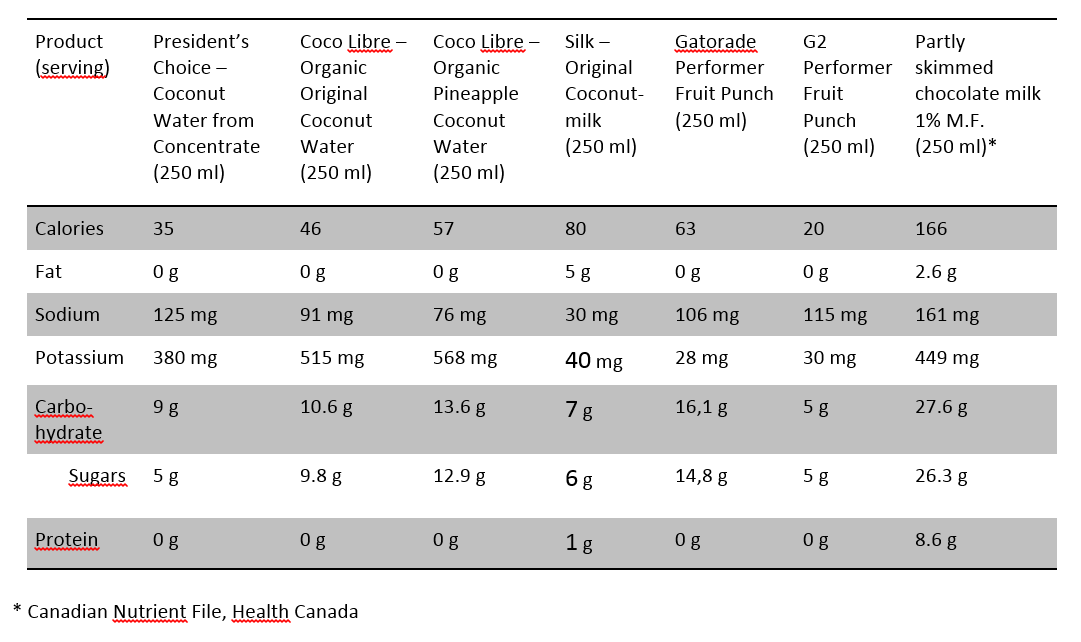
Is it a good post-workout recovery drink? Does it deserve all the alleged merits and benefits claimed by the food industry? Here’s an article to shed light on this trendy product.
Coconut water is found inside immature coconuts. It has a delicate aroma that is especially liked in tropical countries, but also by stars and athletes all over the world.
Comparative table of some varieties of coconut water, coconut milk (Silk), rehydration drinks, and recovery drinks available on the market:

As show in this table, coconut water is not equivalent to coconut milk, especially when it comes to fat content! Coconut milk is made from the white pulp of coconuts.
Coconut water and G2 Performer are interesting rehydration drinks during effort because of their electrolytes (sodium, potassium), especially in hot and humid weather, provided that your workout is completed under one hour. Indeed, they do not provide enough carbohydrates to sustain your endurance over longer periods.
Some companies offer varieties of coconut water with added flavours and sugar. Beware, as these drinks can contain up to 18 teaspoons of sugar per single serving! Despite this, they could be great rehydration drinks for workouts that last over one hour, just like the Gatorate Performer. It is recommended that your rehydration drinks contain between 6% and 8% of carbohydrates. Coco Libre’s Organic Pineapple Water contains about 5%.
However, I would not recommend coconut water as a recovery drink, as it should contain more carbohydrates and most of all, protein, in a ratio of 3 to 1 to replenish your glycogen reserves and properly repair your muscle tissue. Chocolate milk is a better option.
Finally, considering its high potassium content, I can understand that coconut water might seem appealing. But did you know that we lose ten times more sodium than potassium through perspiration? It is therefore not the best choice for you if you sweat a lot. To ensure a proper potassium intake, you can also eat a banana or potato (with the skin). This way, you will meet all your needs while adding fibre and precious vitamins to your menu!
And you, have you ever tried this product? If so, under what circumstances?
References
Protégez-vous. 2013. Bonne pour la santé, l’eau de coco? Online. <http://www.protegez-vous.ca/sante-et-alimentation/bonne-pour-la-sante-leau-de-coco.html>. Page viewed on July 7, 2014.
L’épicerie, Radio Canada. 2013. L’eau de coco, une boisson super star. Online. <http://ici.radio-canada.ca/emissions/l_epicerie/2012-2013/Reportage.asp?idDoc=308805>. Page viewed on July 8, 2014.
Vélo Mag. 2013. Je craque pour toi, mon EAU de COCO. Online. <http://www.velomag.com/Je-craque-pour-toi-mon-EAU-de-COCO>. Page viewed on July 8, 2014.
Coconut Water Under the Microscope is a post from Nautilus Plus. The Nautilus Plus blog aims to help people in their journey to fitness through articles on training, nutrition, motivation, exercise and healthy recipes.
Copyright © Nautilus Plus 2014

A session with a nutritionist will help you on your way!

Let's establish your nutritional goals together and get some expert advice!
Discover our nutrition services
